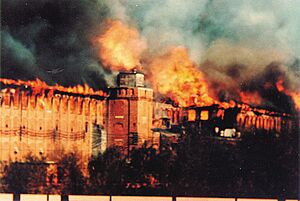Piedmont Number One facts for kids
|
Piedmont Manufacturing Company
|
|
|
Formerly listed on the U.S. National Register of Historic Places
|
|

Piedmont Number One is in the center of the photograph
|
|
| Location | S end of Main St., Piedmont, South Carolina |
|---|---|
| Built | 1876 |
| Engineer | A. D. Lockwood & Company |
| Demolished | 1983 |
| NRHP reference No. | 78002516 |
Quick facts for kids Significant dates |
|
| Added to NRHP | June 2, 1978 |
| Removed from NRHP | March 5, 1986 |
| Delisted NHL | March 5, 1986 |
Piedmont Number One was a large factory that made cloth, called a textile mill. It was located in Piedmont, Greenville County, South Carolina.
This building was once a special place known as a National Historic Landmark. Sadly, a big fire destroyed it in 1983.
The Piedmont Textile Mill
The Piedmont Manufacturing Company started in 1873. It was founded by a man named Henry Pinckney Hammett. Over the next few years, they built a textile mill and a small town for its workers. This town was located by the Saluda River in a place called Garrison Shoals. Today, this area is known as Piedmont.
Piedmont Number One, the main factory building, opened in 1876. It was a four-story building made of brick. It had a special L-shape design. The factory used a large water wheel for power. It had 5,000 spindles and 112 looms. Spindles twist fibers into thread, and looms weave thread into fabric.
The factory was designed by engineers from Providence, Rhode Island, called A. D. Lockwood & Company. Piedmont Number One was made even bigger in 1880 and again in 1900. Another factory, Piedmont Number Two, was built in 1888. It was on the other side of the Saluda River. By 1892, both mills together had 47,000 spindles and 1,300 looms. This shows how much cloth they could make!
Life in the Mill Village
Because the factory needed a lot of water power, it was built in a specific spot. This meant workers needed homes nearby. So, a special village was built just for the factory employees. This village had houses for families, schools for children, churches, and even stores.
In the 1950s, the company sold these village houses and stores to private owners. This meant people could own their homes instead of renting from the company. By 1977, Piedmont Number One was no longer making textiles.
A Historic Landmark
Piedmont Number One was very important to the history of the Southern textile industry. Because of its importance, it was named a National Historic Landmark on June 2, 1978. This is a special title given to places that are very important to American history. Piedmont Number Two was not given this title because it had changed too much over time.
Sadly, a large fire broke out in October 1983. It destroyed most of Piedmont Number One. After the fire, the damaged parts of the building were taken down. Because the building was gone, its special titles as a National Historic Landmark and a National Register of Historic Places site were removed on March 5, 1986.
 | Aaron Henry |
 | T. R. M. Howard |
 | Jesse Jackson |




